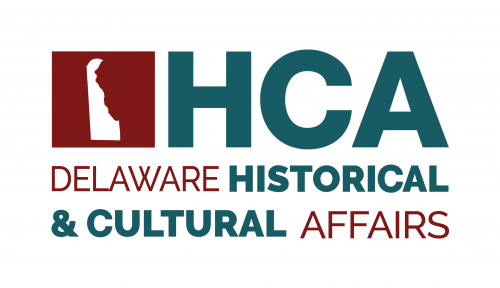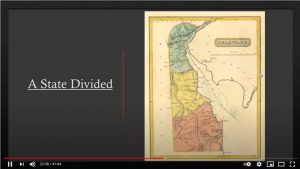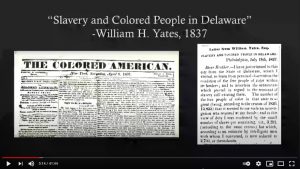Video explores Black life in Delaware 1790–1840
Historical and Cultural Affairs | News | Date Posted: Thursday, April 29, 2021
Historical and Cultural Affairs | News | Date Posted: Thursday, April 29, 2021

(DOVER, Del. — April 29, 2021) — On April 26, 2021, the Delaware Division of Historical and Cultural Affairs released “A Mere Mock Freedom: Free and Enslaved Black Life in Delaware 1790–1840,” a video presentation by Miles Stanley, a doctoral candidate in history at the University of Edinburgh in Scotland. Stanley’s research experience focuses on the history of slavery in the Mid-Atlantic region of the United States during the Early Republic (circa 1780–1830). Go to the following link to watch the video on the division’s YouTube channel: https://www.youtube.com/watch?v=OvpjoyAYfps&ab_channel=DelawareHistory

“A Mere Mock Freedom” explores anti-slavery activity in Delaware in the late-18th century and the subsequent passage of repressive legislation targeting free Blacks in the 19th century. The presentation takes its name from the writings of U.S. Sen. Thomas Clayton of Delaware (1777–1854) who noted, “Under the wretched and mongrel system of laws which have been enacted in regard to them [free Blacks], they enjoy but a mongrel liberty, a mere mock freedom.”
Due in large part to the passage of laws that criminalized the sale of enslaved Blacks into, and out of, the state in the 1780s and 1790s, the free Black population in Delaware grew nearly four-fold between 1790 and 1840. White pro-slavery Delawareans reacted to this population growth with the passage of legislation that sought to strictly limit the rights of the growing number of free Blacks. These reactionary laws pushed free Blacks to the fringes of society in Delaware, making them targets for kidnapping gangs and other forms of violence.

The division has been conducting research for many years on the lived experience of Black Delawareans throughout the state’s history. A portion of this research led to the recent archaeological discoveries of an African American burial ground at the John Dickinson Plantation south of Dover and the identification of the remains of the earliest known enslaved people in the state which were found at the Avery’s Rest site outside Rehoboth Beach.
In response to the renewed calls for racial justice that surged across the nation beginning in May 2020, the division issued a statement on race and equity that identified actions that the agency would be taking to practice inclusive history and to tell the stories of all the state’s diverse people. After reading “The Travail of Delaware Slave Families in the Early Republic” by Gary Nash and Miles Stanley, division Director Tim Slavin asked Stanley to create a video presentation on his research.
Commenting on the genesis of “A Mere Mock Freedom,” Stanley noted, “I was fortunate enough to meet the executive director of the Delaware Historical Society, David Young, while I was living in Wilmington and he had worked with one of my mentors, Gary Nash. It really is a small world, I suppose. After I was accepted for the Ph.D., David put me in touch with the HCA [Division of Historical and Cultural Affairs]. They had just started their work on [the African American burial ground at] the John Dickinson Plantation and they needed input on the lived experiences of free and enslaved Blacks during this period. That just so happened to be a big part of my project. After a few meetings … I was asked to produce a recorded presentation that examined a topic related to my research.”
“I hope that we continue to share and discuss these crucial aspects of America’s history,” Stanley added.
Originally from San Diego, Calif., Miles Stanley is a doctoral candidate in history from the University of Edinburgh in Scotland. He is a historian of slavery in the Mid-Atlantic with a particular focus on free and enslaved Black life in Delaware during the Early Republic period. He holds a bachelor’s degree from the University of California, Los Angeles, and a master’s degree from the University of Edinburgh, both in history. In order to get a feel for the history that he was studying, Stanley lived in the Quaker Hill neighborhood of Wilmington, Del. from 2018 to 2019. He and his wife Eva have made their home in Edinburgh since 2020.

The Division of Historical and Cultural Affairs is an agency of the State of Delaware. The division enhances Delaware’s quality of life by preserving the state’s unique historical heritage, fostering community stability and economic vitality and providing educational programs and assistance to the general public on Delaware history. The division’s diverse array of services includes operation of five museums which are accredited by the American Alliance of Museums, administration of the State Historic Preservation Office, conservation of the state’s archaeological and historic-objects collections, operation of a conference center and management of historic properties across the state. Primary funding for division programs and services is provided by annual appropriations from the Delaware General Assembly and grants from the National Park Service, Department of the Interior, a federal agency. However, the contents and opinions expressed in the division’s programs and services do not necessarily reflect the views and policies of the Department of the Interior.
Related Topics: African American, Black history, history, lecture, remote program, video, virtual program
Keep up to date by receiving a daily digest email, around noon, of current news release posts from state agencies on news.delaware.gov.
Here you can subscribe to future news updates.
Historical and Cultural Affairs | News | Date Posted: Thursday, April 29, 2021

(DOVER, Del. — April 29, 2021) — On April 26, 2021, the Delaware Division of Historical and Cultural Affairs released “A Mere Mock Freedom: Free and Enslaved Black Life in Delaware 1790–1840,” a video presentation by Miles Stanley, a doctoral candidate in history at the University of Edinburgh in Scotland. Stanley’s research experience focuses on the history of slavery in the Mid-Atlantic region of the United States during the Early Republic (circa 1780–1830). Go to the following link to watch the video on the division’s YouTube channel: https://www.youtube.com/watch?v=OvpjoyAYfps&ab_channel=DelawareHistory

“A Mere Mock Freedom” explores anti-slavery activity in Delaware in the late-18th century and the subsequent passage of repressive legislation targeting free Blacks in the 19th century. The presentation takes its name from the writings of U.S. Sen. Thomas Clayton of Delaware (1777–1854) who noted, “Under the wretched and mongrel system of laws which have been enacted in regard to them [free Blacks], they enjoy but a mongrel liberty, a mere mock freedom.”
Due in large part to the passage of laws that criminalized the sale of enslaved Blacks into, and out of, the state in the 1780s and 1790s, the free Black population in Delaware grew nearly four-fold between 1790 and 1840. White pro-slavery Delawareans reacted to this population growth with the passage of legislation that sought to strictly limit the rights of the growing number of free Blacks. These reactionary laws pushed free Blacks to the fringes of society in Delaware, making them targets for kidnapping gangs and other forms of violence.

The division has been conducting research for many years on the lived experience of Black Delawareans throughout the state’s history. A portion of this research led to the recent archaeological discoveries of an African American burial ground at the John Dickinson Plantation south of Dover and the identification of the remains of the earliest known enslaved people in the state which were found at the Avery’s Rest site outside Rehoboth Beach.
In response to the renewed calls for racial justice that surged across the nation beginning in May 2020, the division issued a statement on race and equity that identified actions that the agency would be taking to practice inclusive history and to tell the stories of all the state’s diverse people. After reading “The Travail of Delaware Slave Families in the Early Republic” by Gary Nash and Miles Stanley, division Director Tim Slavin asked Stanley to create a video presentation on his research.
Commenting on the genesis of “A Mere Mock Freedom,” Stanley noted, “I was fortunate enough to meet the executive director of the Delaware Historical Society, David Young, while I was living in Wilmington and he had worked with one of my mentors, Gary Nash. It really is a small world, I suppose. After I was accepted for the Ph.D., David put me in touch with the HCA [Division of Historical and Cultural Affairs]. They had just started their work on [the African American burial ground at] the John Dickinson Plantation and they needed input on the lived experiences of free and enslaved Blacks during this period. That just so happened to be a big part of my project. After a few meetings … I was asked to produce a recorded presentation that examined a topic related to my research.”
“I hope that we continue to share and discuss these crucial aspects of America’s history,” Stanley added.
Originally from San Diego, Calif., Miles Stanley is a doctoral candidate in history from the University of Edinburgh in Scotland. He is a historian of slavery in the Mid-Atlantic with a particular focus on free and enslaved Black life in Delaware during the Early Republic period. He holds a bachelor’s degree from the University of California, Los Angeles, and a master’s degree from the University of Edinburgh, both in history. In order to get a feel for the history that he was studying, Stanley lived in the Quaker Hill neighborhood of Wilmington, Del. from 2018 to 2019. He and his wife Eva have made their home in Edinburgh since 2020.

The Division of Historical and Cultural Affairs is an agency of the State of Delaware. The division enhances Delaware’s quality of life by preserving the state’s unique historical heritage, fostering community stability and economic vitality and providing educational programs and assistance to the general public on Delaware history. The division’s diverse array of services includes operation of five museums which are accredited by the American Alliance of Museums, administration of the State Historic Preservation Office, conservation of the state’s archaeological and historic-objects collections, operation of a conference center and management of historic properties across the state. Primary funding for division programs and services is provided by annual appropriations from the Delaware General Assembly and grants from the National Park Service, Department of the Interior, a federal agency. However, the contents and opinions expressed in the division’s programs and services do not necessarily reflect the views and policies of the Department of the Interior.
Related Topics: African American, Black history, history, lecture, remote program, video, virtual program
Keep up to date by receiving a daily digest email, around noon, of current news release posts from state agencies on news.delaware.gov.
Here you can subscribe to future news updates.